News
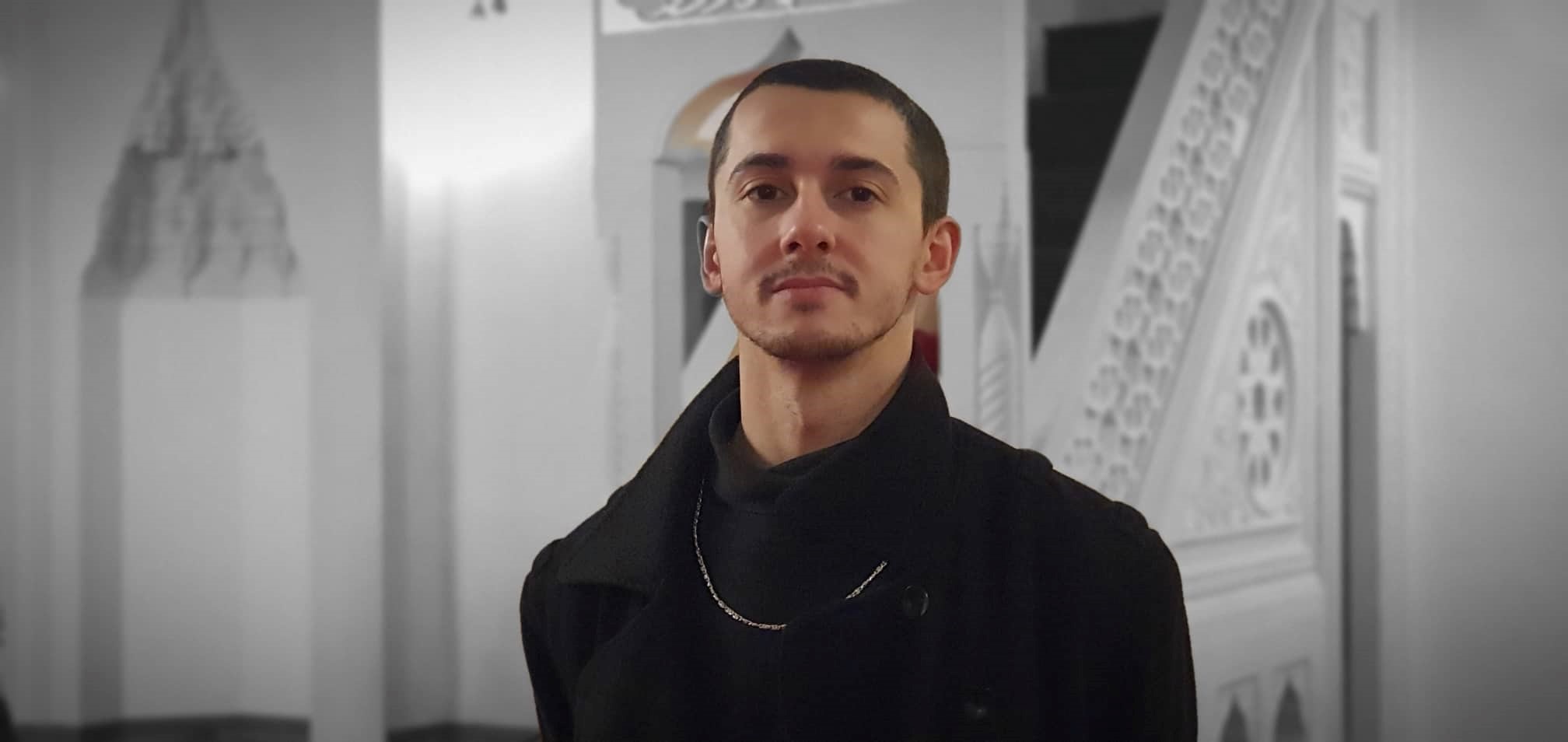
Interview with the young artist Nurkan Nuf from Razgrad: About art, religion and the person between them
31 March 202024-year-old Nurkan Nuf from Razgrad
“Religion and art are two “sisters” because they both are constant, we could say, organic needs for the spirit…”
From the scientific paper of Dr. Krastcyo Krastev “Art and Religion”
Nurkan Nuf was born in August, 1996, in Razgrad. He received his secondary education in the Professional Technical Secondary School “Sándor Petőfi” in his hometown, where he was studying “Electrical equipment of manufacturing”. Then he began to study in the “St Cyril and St Methodius” University of Veliko Tarnovo, where in 2019 earned a bachelor’s degree in “Painting and Intermedia” at the Department of Painting. He graduated with thesis defense on “Cultural Symbiosis”, which includes implementation of a project of a Bulgarian embroidery with motifs from the Arabic calligraphy. At the present moment he continues his higher education in the one-year master’s program of the University of Veliko Tarnovo “Painting and Unconventional Techniques in Art”.
Nurkan, in another interview with you, in the context of the new era in art, you say “If I give you everything, you will wonder where you shall start from” … Now I am also in the same situation, you are indeed so talented and Versatile artist, you give so much in art, that I wonder where and how to start this interview.
Would you please tell us when and how you took the brush and the paints for a first time? How did you find this great talent of yours?
When I was between the 10th and 11th grade in the secondary school I began painting seriously. Then I found a video on how to make canvas for painting. At that time, I did not have so much interest in art as in the technical part of the things. So I made that canvas and something told me to paint it. The first thing which I painted, was the wolf from “Nu Pagadi” with varnishes and painters’ brushes.
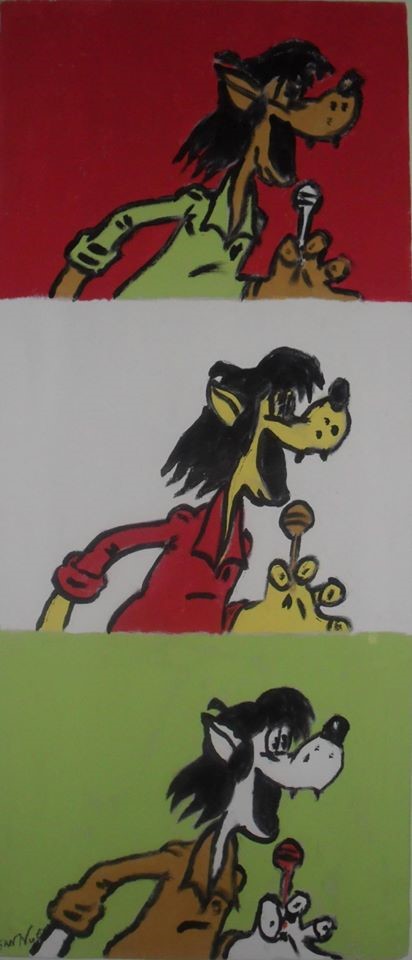
The first concious work of Nurkan Nuf
The person who inspired me to follow the path of paintings was my brother. But if we go even further back, my father was the one who first began to teach me how to draw – I still remember the island and the palm tree that we painted together. But actually my brother was the one who inspired me to be myself – to paint not just what I see, but what I feel. And to be a true and conscious artist. If it was not my brother, today I would probably be electrician somewhere and I would never do art, neither I would have a higher education.
What art you are currently doing – is the definition that you are an alternative artist or an artist of the unconventional art, correct?
Before I used to define myself as such, yes, but now I already prefer to devote to all this beauty that I feel. Before I was always trying to be original, not to be like the others, to be more special… Today my aspiration is to be “nobody” which I accept passively. And as someone had said… “The lower you are, the higher you actually are.”
Now I am involved in many fields of art – I actually make sculptures, I do poetry, paintings… I do Islamic calligraphy and paintings. I cannot define myself in one particular style, because I myself avoid having style.
You are the author of maybe dozens of solo exhibitions; you have also participated in many joint such. Which is the exhibition that you are proudest of, or that has left the most tangible imprint in your path as an artist?
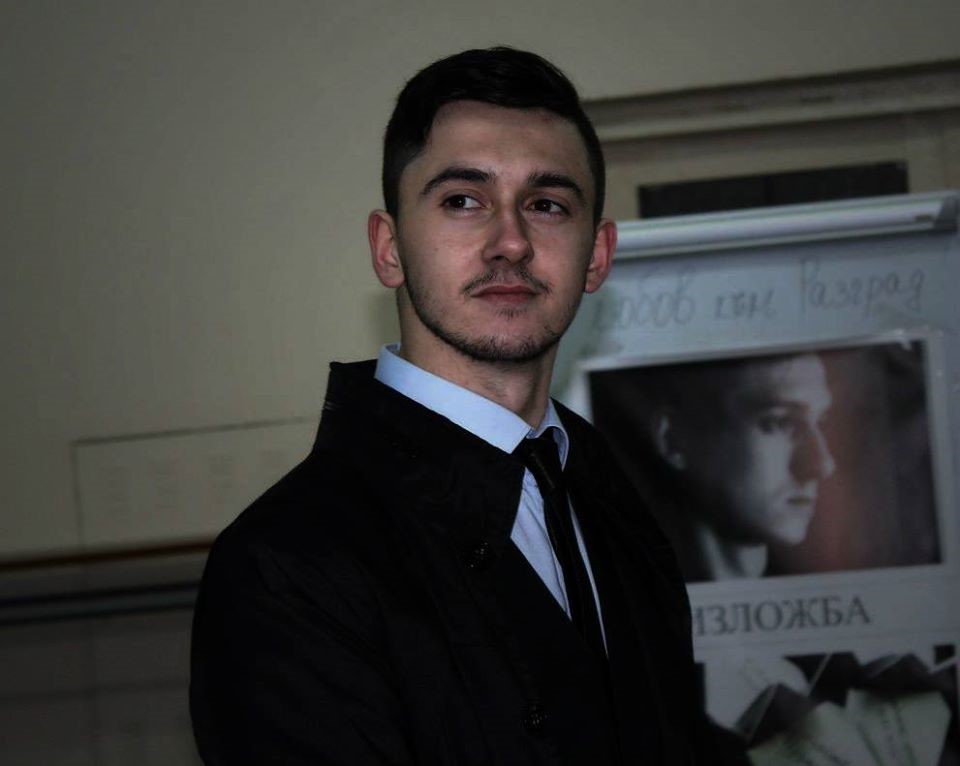
My first exhibition was in 11th grade in the secondary school and it was in “pop art” style (which means “popular art” or painting of celebrities). But after I embraced Islam I have already avoided idols and as a whole I stopped painting faces.
After that I participated in another one joint exhibition. Later on I had a solo exhibition again, which was entitled “Splin” (i.e. “causeless melancholy”) and was in one “dark” moment of my life, so the exhibition was also in this direction. Till my graduation from the secondary school I had also a third solo exhibition. As a university student I had dozens of exhibitions as well. But there is no such to be proud of, because as a whole I am already avoiding pride in anything.
Until several years ago, in my first years in the university, I used to be proud of myself a lot. I was involved in so many things, I was always busy, I was traveling from town to town, from exhibition to exhibition, which made me very tired mentally and I suffered a lot from all this – I got to the so called anxiety disorder “burn out”. From that moment onwards I tamed this pride. I realized that one should be very careful with pride and that one should never manifest any form of arrogance, no matter how successful he is in a certain field.
And did you discover Islam in that difficult period of your life?
Islam touched me in a certain way for a first time when I was the second year in the university. Then I temporarily started doing also Islamic calligraphy, which subsequently I left for a short time. But from five months now I again started painting Islamic calligraphy. Then I decided to make one donation to the mosque in Veliko Tarnovo, in connection with which I met with the local imam, the Regional Mufti and with other representatives of the management of Regional Mufti’s Office – Veliko Tarnovo. Step by step they introduced me to Islam. In Tarnovo I learned to perform the five-time prayer, as well as all things which are halal and haram.
How do you feel now, when Islam is already a part of your life?
I do not even know how to describe it. Provided that two years ago I was suffering anxiety disorder and after my meeting with religion everything this disappeared just like that… Islam is something incredible!
You are entirely self-taught in Islamic calligraphy, aren’t you? How did you become interested in this art?
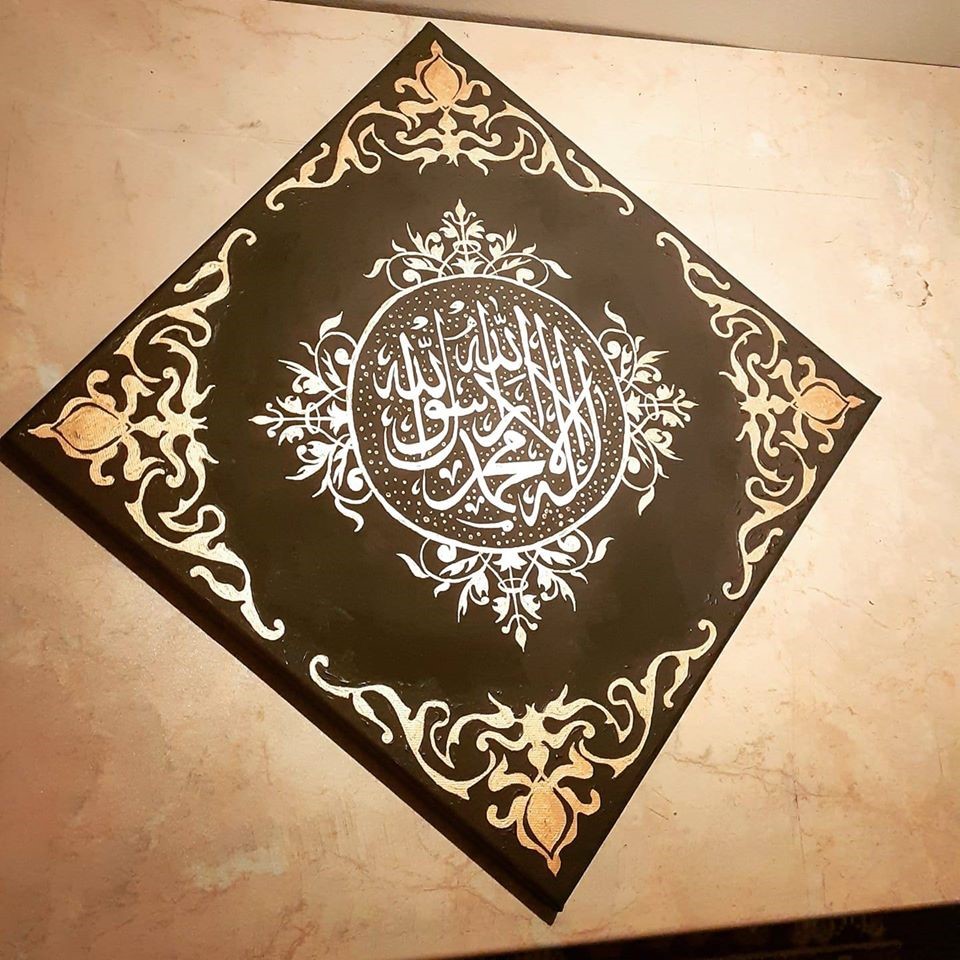
Nurkan Nuf’s calligraphy
Yes, I have learned to read the Qur’an myself – through many and different methods. I still spell but I can already read in Arabic. I do the calligraphies both – by hand – by qalam and brush, and digital. I am still improving my calligraphic works by qalam, because there are certain proportions that must be respected, etc. Actually most of my calligraphies are painted by brush or digitally.
For your graduation in “Painting and Intermedia” in “St Cyril and St Methodius” University of Veliko Tarnovo you elaborated one very interesting thesis project – “Cultural Symbiosis” which included the implementation of a project of a Bulgarian embroidery with motifs from the Arabic calligraphy. How this very alternative idea of yours was born, would you tell us?
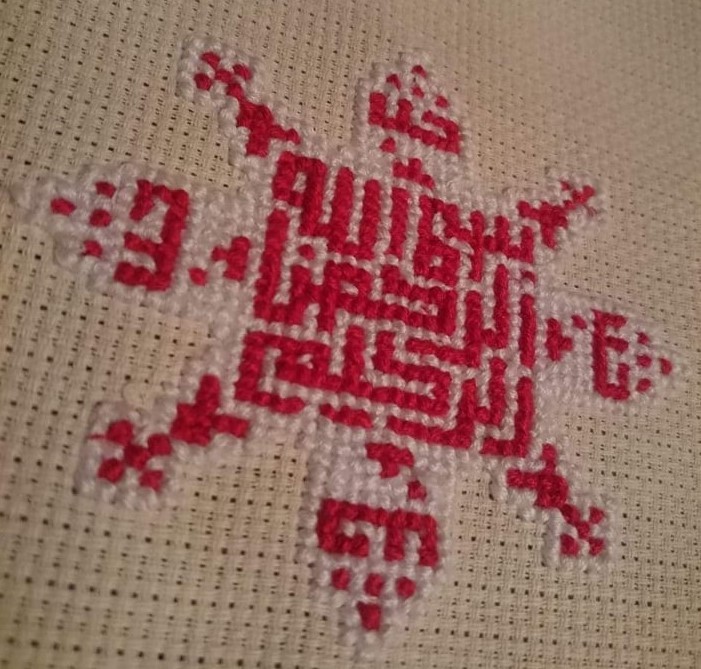
“Cultural Symbiosis” – between embroidery and calligraphy
The idea was born in connection with the movie “Whose is this song?” by Adela Peeva, that I watched. It is related to a song which is being sung in all Balkan countries and every nation claims that it is its own folk song. And just as in the movie it is sought the truth about one song, so I also want to show with my thesis work exactly this – if one Bulgarian look at this work “Cultural Symbiosis” he would see in it a Bulgarian embroidery. But if one Arab or a person who knows Arabic language see it – he would find in it calligraphy… In this sense, there is no way to be sure about the origin of a particular culture. We can only be grateful that it exists. And we should use culture not only as a means of distinction but to get closer to one another.
It is interesting the fact that your brother, Denis Nuf, is also an outstanding artist, but in another field – he is “painting” by words. Have you ever had so far any joint projects with him or have you thought of such – to find a focal point between art of painting and art of words?
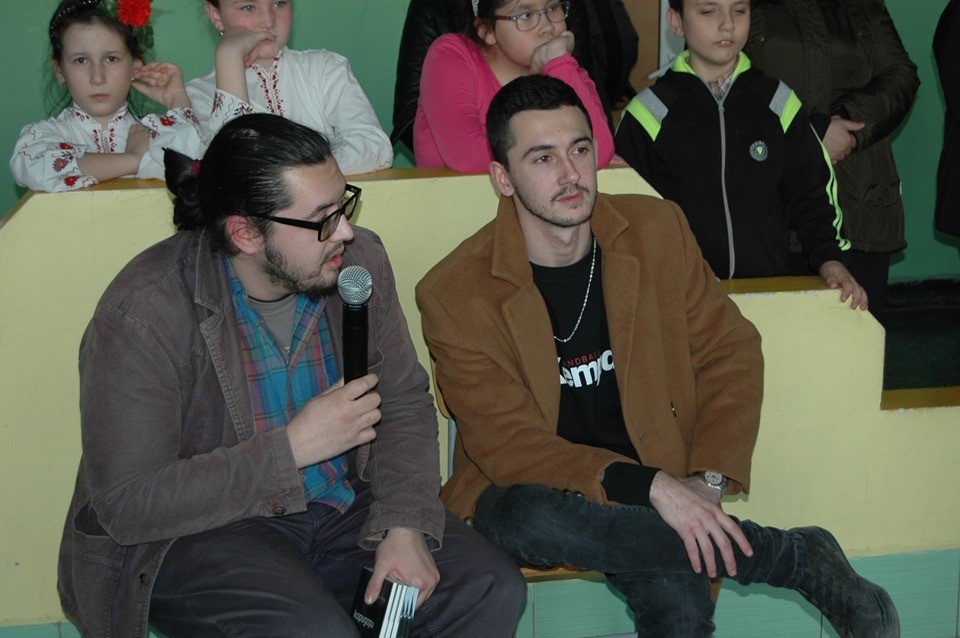
Nurkan Nuf (right) together with his elder brother Denis Nuf (left)
Yes, for one of my solo exhibitions in Razgrad the paintings were presented in the air – fixed through cord for the ceiling. At each of my paintings there was one of his poems. But as a whole the focal point can be also found in the fact that each word that he said to me, has influenced in a certain way different paintings of mine. So, as it is with blood, so in the different fields of art, there always are focal points.
What are your current projects and what are you plans for the nearest future?
My wish is to do an exhibition with the Islamic calligraphies that I paint. It is planned that the exhibition will be organized in my hometown Razgrad at the earliest opportunity, when the state of emergency in the country is lifted and the passing of the virus wave.
Where do you see yourself after ten years? What would you like to achieve in the fields of your various interests, for example?
I am satisfied with what I have at the moment. Alhamdulellah, I do not need anything else. I do not want to get to disappointments, so that I prefer not to live with certain dreams. I wish to further develop myself in the field of Islamic calligraphy, because there is still a lot to learn.
And what is the role of religion in your art work?
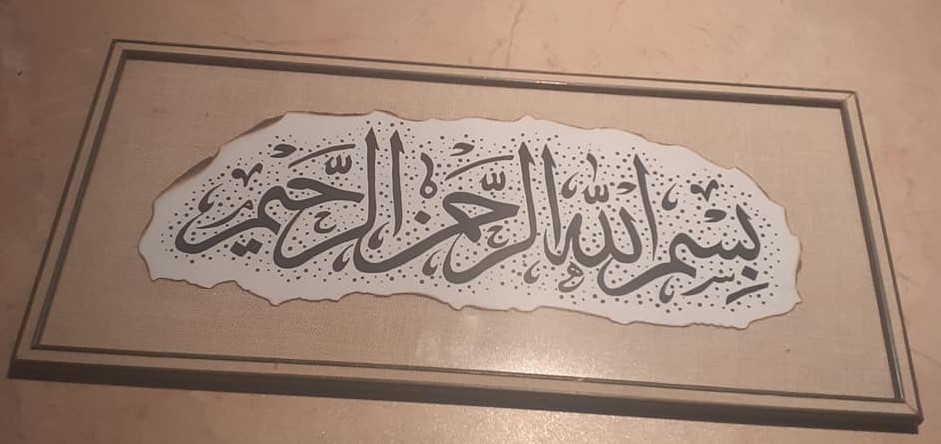
Nurkan Nuf’s calligraphy– “Bismillahi-r-rahmani-r-rahim”
The very fact that I began painting just like that, from nothing, I take it as a gift. Now I am trying to maximum benefit from this gift of mine and that is why I gave as a gift or sold at a very low price most of my paintings. Much precious as a reward for a my work is to see the smile in the person in front of me, than to get some money that come and go. As it is said… “The smile of a person shines more than a gold.”
I would like to end this interview with the quote from the already forgotten to a certain extent scientific paper, entitled “Art and Religion” of Dr. Krastyo Krastev, according to whom “…without religion, art and ethical emotions life for us is neither thinkable, nor bearable, because it would lose all content and meaning. Soul lives in them its real life and without them it would be homeless in a universe of worlds that are alien to it and it to them…”
How would you comment on this theory, do you agree with it? Where do art and religion meet and separate according to you?
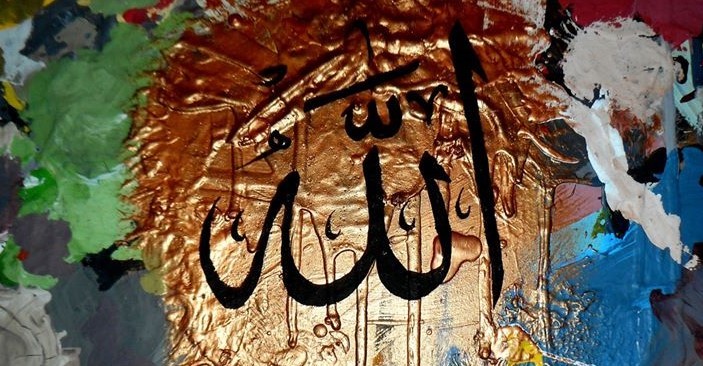
Detail of a painting of Nurkan Nuf
I think that religion, art and science are connected in a very special way. And art is in the middle between the other two. Everything which is created is some form of art. It is the same with people – we are a product of the art of the Almighty, Who created us. Art also is the linking unit between religion and science. Religion teaches us emotional intelligence, while science teaches us rational intelligence… And in this sense, yes, I agree with the theory of Dr. Krastev.
Thank you from the bottom of my heart for this interview and for your time! Indeed, it is very inspiring and encouraging to see young talents like you in the ranks of the Muslims in Bulgaria! I do hope that after this material will follow other similar ones, that will focus on the talented and active youths from the Muslim community in our country!
Interviewer: L. Chausheva
Photos: Personal archive of Nurkan Nuf